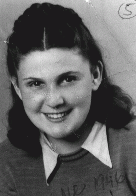
Judith Kalman
Born: August 23, 1927
Erdobenye, Hungary
Judith was the only child born to a Jewish couple who lived in Hatvan, a small town 36 miles northeast of Budapest. Judith's father worked in his brother's business, marketing grains and other agricultural products purchased from local farms. When she was 3, Judith gave her first public recitation of poetry, an interest that she pursued throughout her childhood.
1933-39: Judith's family wasn't religious--they were Hungarians who happened to be Jewish, and their family was well-liked in Hatvan. But in the late 1930s everything slowly started changing. New, anti-Jewish laws restricted entry for Jews into high schools, universities, and certain professions. Her father lost his white-collar job and became a bricklayer. When Judith walked home from school, kids spat on her and called her names. She learned that she was a Jew.
1940-44: German troops entered Hungary on March 19, 1944, and a few weeks later, Judith was forced with hundreds of other Jews into a ghetto set up at the sugar factory. One day, Judith and her mother were taken out of the ghetto with a group to work in the fields. Returning at the end of the day, they were forced to walk on the sides of the road and kiss the filthy ground where horses had passed before them. Townspeople lined the roadsides, jeering and clapping. Judith's so-called "friends" in the crowd laughed and pointed at her.
In June 1944, 16-year-old Judith was deported to Auschwitz. She weighed 48 pounds when she was liberated at Seeshaupt on May 1, 1945. Judith immigrated to the United States in 1948.

